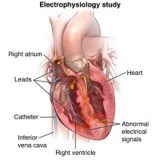Electrophysiology Procedures
Electrophysiology Procedures
At Bay Area Heart Center in St. Petersburg and Largo, Florida, our electrophysiologists perform procedures for advanced cardiology care. Electrophysiology is a specialized form of cardiology that concentrates on the diagnosis and treatment of conditions affecting heart rhythm. It typically involves ablation procedures as well as the installation of cardiac devices.
Electrophysiology Studies
Electrophysiology testing makes it possible to study heart rhythm disturbances under controlled conditions. By using special insulated wires called catheters, your doctor is able to identify the rhythm disturbance and choose the best treatment method.
The procedure is performed in the catheterization lab. It involves inserting thin plastic catheters into the large blood vessels in your groin and arm, then guiding them to the heart with the help of a special X-ray machine.
When the catheters are in place in your heart, a doctor who specializes in electrophysiology will stimulate the heart artificially with electrical impulses delivered through the catheters. Your doctor will watch the heart’s reaction to determine the extent of rhythm disturbance.
Cardioversion
Cardioversion can correct a heartbeat that’s too fast (tachycardia) or irregular (fibrillation). It is usually used to treat people who have atrial fibrillation or atrial flutter. These are conditions in which the electrical signals that cause your heart to beat in a regular rate and rhythm don’t properly travel through the upper chambers of your heart.
Tilt Table Testing
Tilt table testing is used to diagnose the cause of frequent fainting or dizziness. You will lie on a table that is slowly tilted upward. Your doctor will then measure how your blood pressure and heart rate respond to the force of gravity. If your blood pressure drops and stays low during the test, you may faint or feel dizzy, which can happen if your heart rate is abnormally slow or fast.
Cardiac Ablation Procedures
- Atrial fibrillation ablation/Pulmonary Vein Isolation
Atrial fibrillation is one of the most common cardiac arrhythmias. Ablation is the removal or melting away of unwanted structure or tissue. Ablation of atrial fibrillation can be accomplished with different techniques. The most established approach is via radiofrequency ablation around the pulmonary veins, which are the veins that bring oxygenated blood from the lungs back to the left side of the heart.
- Ablation Therapy for AV Node, Supraventricular Tachycardio, & Ventricular Tachycardia
Heart rhythm disturbances that originate in the upper heart chambers (atria) are referred to as supraventricular tachycardias or SVT, the most common of which originates in the area of the AV node (the only electrical connection between the upper and lower chambers) Of the heart rhythm disturbances that originate in the lower heart chambers (ventricles), the most common is ventricular tachycardia, and it is generally life-threatening.
Ablation therapy is a minimally invasive procedure that uses radiofrequency (RF) electrical energy to eliminate the heart cells that cause arrhythmia. It is often a permanent cure.
Cardiac Implantation Procedures
- Permanent Pacemakers
A pacemaker is a battery-operated device that helps maintain a normal heart rhythm. It sends electrical signals to the heart to stimulate contracting or pumping of the heart muscle. It is designed specifically for patients who have irregular or very slow heart rates and symptoms of fainting or fatigue.
The rate is set by the doctor. The pacemaker generator is placed under the skin on the chest wall below the collarbone. It contains a battery and wires (leads), which are positioned inside the heart and transmit the signal from the battery to the heart, thus causing the contracting.
- Bi-ventricular AICDs (Automatic Implantable Cardioverter Defibrillator)
A bi-ventricular AICD is a special kind of pacemaker used in cardiac resynchronization therapy (CRT), or bi-ventricular pacing. This computerized device is implanted in the chest wall of heart failure patients whose left and right heart chambers do not beat at the same time.
Through leads placed on or in the heart, a bi-ventricular AICD can detect a cardiac disturbance such as the onset of heart failure, tachycardia, and/or fibrillation and generate electrical impulses to resynchronize the contractions of the heart’s ventricles and help the heart pump blood throughout the body more efficiently.
This device has all the features normally included in pacemakers and defibrillators, but its primary purpose is to assist in the management of heart failure.
- Defibrillator Implantation
An implantable cardioverter defibrillator system, or implantable cardiac device (ICD), is a small electronic device that monitors heart rhythm and delivers a shock to correct a potentially fatal heart rhythm if it should occur.
The generator is surgically implanted beneath the skin and muscle below the collarbone. Wire electrodes attach the pulse generator to the heart. Some of the wires are inserted through veins into the inside of the heart and can sense the heartbeat. Other wires may be attached directly to the heart. These wires are used to deliver the shock, if necessary, which converts the heart back to its normal rhythm.
- Implantable Loop Records
An implantable loop recorder is a small device that is implanted under the skin to help identify the causes of fainting. Syncope (or fainting) is a temporary loss of consciousness. Certain heart disorders can cause fainting, such as abnormal heartbeats called arrhythmias.
Why Bay Area Heart Center?
LATEST TECHNOLOGY
We use the latest technologies for your diagnostic testing
EXPERIENCED PHYSICIANS
Our physicians are experienced in many different specialties.
MULTIPLE LOCATIONS
We have 3 locations to choose from, so your testing can be closer to home.
THE LATEST DIAGNOSTIC TESTING
We stay up to date on the best diagnostic testing available.
CARING STAFF
Our staff take the extra step to make your visit as quick and pleasant as possible.

